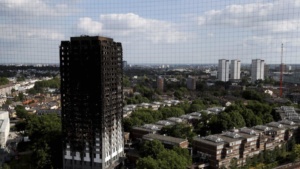A public inquiry into the Grenfell Tower fire in London that killed 80 people in June began on Tuesday with a mission to examine the cause of and response to the tragedy, but not broader issues such as social housing policy.

The destruction of the 24-storey social housing block, home to a poor, multi-ethnic community, in an inferno that spread with terrifying speed in the middle of the night shocked the nation and raised public anger over social inequalities.
Grenfell Tower was part of a deprived housing estate in the London borough of Kensington and Chelsea, one of the richest areas in the country. The fire has prompted debate about the impact on poor communities of years of public spending cuts by Conservative-led governments.
The inquiry, led by retired judge Martin Moore-Bick, was announced by Conservative Prime Minister Theresa May to show she wanted the truth about the disaster to emerge after her initial response was seen by survivors as slow and insensitive.
The inquiry formally opened on Tuesday with the publication of its terms of reference. Moore-Bick will start hearings in September.
It will examine the cause and spread of the fire, the design, construction and refurbishment of the tower, fire regulations relating to high-rise buildings, whether they were complied with at Grenfell Tower, and the actions of the authorities before and after the tragedy.
But Moore-Bick said the inquiry would not delve into broader issues such as social housing policy and the relationship between the community and the authorities, even though many local people wanted it to.
That drew immediate criticism from the local member of parliament, Emma Dent Coad of the opposition Labour Party, who said it was precisely what the community had feared.
“We were told ‘no stone would be unturned’ but instead are being presented with a technical assessment which will not get to the heart of the problem: what effects if any the lack of investment into social housing had on the refurbishment project,” she said in a statement.
Moore-Bick said it would take too long to fully examine social housing policy issues when there was a need for the inquiry to quickly identify safety problems that may be putting lives at risk in other tower blocks. May said the government would tackle the deeper issues in a different way.
“I am determined that the broader questions raised by this fire — including around social housing — are not left unanswered,” she said in a statement.
May said the housing minister, Alok Sharma, would personally meet as many social housing tenants as possible in the Grenfell Tower area and across Britain to help identify common concerns, and there would be further announcements about this shortly.
But Dent Coad rejected the assurance. “We have no confidence whatever in the ability of Alok Sharma and a few politically compromised individuals to take on the task of answering this most important question,” she said.
The Grenfell Tower inquiry faces an uphill struggle in gaining the cooperation of those affected by the fire, many of whom are distrustful of the authorities and see Moore-Bick as a remote, establishment figure unlikely to relate to their lives. During consultation meetings with the community in recent weeks, he was heckled several times.
Kindly follow us on twitter:@AfricanVoice2









